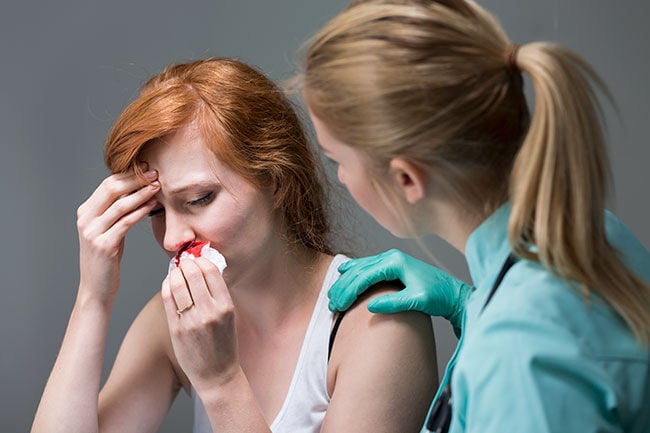
When to Worry about a Nosebleed
This post contains affiliate links to products and services. We may receive compensation when you click on links.
If Hollywood is to be believed, nosebleeds are either a sign of certain death or a supernatural gift.
In the 2002 horror film The Ring, the protagonist, played by Naomi Watts, gets a nosebleed while watching a terrifyingly terminal tape. In Scanners, Firestarter, and Stranger Things, nosebleeds follow telekinetic episodes. And we’ve all seen those moments when a character feels dizzy, gets a nosebleed, and then immediately assumes their death is imminent, often while dramatic music plays.
It’s no wonder that so many of us panic when we feel the unmistakable drip or notice a spot of red on the tissue. But contrary to what you’ve seen in countless TV shows and blockbusters, nosebleeds are mostly harmless.
When to Worry about a Nosebleed
A nosebleed doesn’t mean you’ve gained telekinetic powers, and it isn’t necessarily indicative of a serious illness. Most nosebleeds are the result of nose picking, dry air, sinus issues, and even blowing your nose too hard.
The blood vessels inside your nose are very delicate, and it doesn’t take much for them to rupture and bleed. However, there are times when a nosebleed could warrant a trip to the emergency room or necessitate further testing.
These include:
The Bleeding Doesn’t Stop
As soon as your nose starts to run, follow these steps to stop the bleeding:
Sit down on the edge of a chair/bed and lean forward slightly.
Gently pinch the soft part of your nose.
Wait for 10 to 15 minutes.
During those 10 to 15 minutes, refrain from releasing your fingers to check if the bleeding has stopped.
Most nosebleeds are over within a few minutes. If the bleeding continues for more than 15 minutes despite your best efforts, you may need medical attention.
The Bleeding is Very Heavy
Nosebleeds can occur at the back (posterior) or front (anterior) of the nose. The latter is the most common.
Nosebleeds tend to produce very little blood and clear up on their own. With posterior nosebleeds, the bleeding is heavier and they are more likely to require medical attention.
If you are losing a lot of blood and it’s showing no signs of stopping, seek medical attention immediately.
There are a few things that doctors/surgeons can do to stop the bleeding, so if it’s bad, make that call. There are also some at-home solutions available, including Nampons, which work by plugging the nose and introducing a blood clotting agent. If you suffer from frequent and severe nosebleeds, it pays to have a box or two on standby.
You Are Taking Blood Thinning Medications
Blood thinning medications can prevent the blood from clotting straight away and turn a relatively harmless incident into something much more serious and concerning. Getting a nosebleed while taking blood thinning medications won’t always necessitate a visit to the emergency room. But it warrants more caution, as heavy bleeding is more common.
You Get Frequent Nosebleeds
Frequent nosebleeds are often the cause of bad habits and environmental issues. For instance, if you’re constantly surrounded by dry air, don’t drink a lot of water, and aggressively pick your nose, the delicate blood vessels inside your nose will burst.
If, however, there is no immediate cause and the bleeding is persistent, you should get yourself checked over.
As noted at the outset of this article, nosebleeds are rarely a cause for concern, and that’s true even for frequent nosebleeds. But it’s best to err on the side of caution.
You Experience Other Symptoms
Nosebleeds that occur as a result of nose blowing or picking rarely present with other symptoms. If there is a serious injury or underlying condition, however, you may feel dizzy, lightheaded, or suffer from migraines and headaches.
Contact a healthcare provider if this is the case.
Of course, if you suffer from health anxiety, there’s a good chance your nosebleed will make you anxious and even trigger a panic attack. It makes you anxious, which in turn makes you lightheaded, and from there, it’s easy to spiral.
A few minutes and several Google searches later, you’re convinced you’ve got a rare disease and have only minutes to live.
Try to stay calm and separate nosebleed symptoms from those caused by panic.
You Have Difficulty Breathing
The reason you lean forward when you have a nosebleed is that it prevents the blood from dripping down your throat, which could cause breathing difficulties or lead to an upset stomach.
If you’re struggling to breathe regardless of your positioning, there could be a more serious issue at play. Again, panic plays a role, but if you find that you can’t catch your breath, you should seek medical attention.
You Have Suffered a Blow to the Head
A blow to the bridge of the nose can cause a nosebleed, and it’s usually not serious. It’s a common occurrence in combat sports, and you’ll often see boxers suffer from a broken nose during the fight, only for the cutman to wipe it, pack it, and then send them back into the fight.
But a blow that leads to a nosebleed could also be indicative of something more serious, especially if the blow was forceful and the bleed is accompanied by confusion, dizziness, and breathing difficulties.
You Have a Blood Clotting Disorder
Blood clotting disorders like Von Willebrand’s disease and hemophilia prevent your blood from clotting and could lead to uncontrollable bleeding. Speak to your doctor if you suffer from one of these conditions and have frequent nosebleeds.
What Diseases and Conditions Cause Nosebleeds?
We can’t stress enough that most nosebleeds are completely innocuous. What’s more, they are very rarely a common symptom of disease, and when they are, they rarely occur independently of other symptoms.
For example, they may occur more frequently in people with colds, flu, sinus issues, and allergies, as the nose undergoes a lot of trauma and it’s hard to keep the nasal passage moist. But of course, if you have flu or sinus issues, a nosebleed won’t be the first or even the most prominent symptom.
Blood clotting disorders can increase the risk and cause more severe nosebleeds. The same is true following excessive use of intranasal drugs (including cocaine) and alcohol.
High blood pressure has also been linked with nosebleeds and many people with the condition report having more frequent and more severe nosebleeds. However, there is no clinical evidence suggesting that high blood pressure causes nosebleeds. It could simply be that the condition makes nosebleeds worse and therefore more noticeable.
Leukemia can present with recurrent nosebleeds, but there is a long list of other symptoms, including swollen lymph nodes, frequent infections, fever/chills, easy bruising/bleeding, night sweats, and bone pain.
Nasal polyps and nasal tumors may cause nosebleeds and the issue tends to be common after nasal surgery as well.
Hereditary Hemorrhagic Telangiectasia (HHT)
If nosebleeds occur almost daily and present at a very early age, it could indicate a condition known as hereditary hemorrhagic telangiectasia (HHT), which is also known as Osler-Weber-Rendu disease.
HHT is a hereditary condition that creates abnormal connections between arteries and veins. Known as arteriovenous malformations (AVMs), these abnormalities often form in the liver, lungs, brain, and nose. They can become enlarged over time and may rupture spontaneously, causing persistent bleeding and complications such as anemia.
If you or your child has symptoms of HHT and/or you have a family history of the disease, contact your healthcare provider. It is an autosomal dominant disorder, so if just one parent has the condition, their child has a 50% chance of inheriting it.
If no one in your family has ever been diagnosed or presented with any symptoms, HHT is unlikely to be the cause of your nosebleeds.
How are Nosebleeds Prevented and Treated?
The cause and extent of the bleeding will determine the best course of treatment:
Dry Air: If you live in a very dry environment, a humidifier can add a little moisture and may prevent nosebleeds. A saline nasal spray can also help, as can a little dab of petroleum jelly on the problem area.
Nose Picking: Unsurprisingly, the easiest solution is to stop picking or take more care. Trimming your nails helps, as it reduces the risk of scratches and cuts.
Damage to the Nasal Septum: The nose may just need time to heal, but you should consult with a medical professional to ensure it is set properly.
Medical Emergency: In the emergency room, doctors can stop a severe nosebleed using nasal packing, whereby the nose is “packed” to block the flow of blood, or embolization, which completely blocks the supply of blood to the nose.
Summary: Worrying about Nosebleeds
Contrary to what you may have seen in TV shows and films, nosebleeds are not always a sign of serious trauma or disease, nor do they indicate that you’ve gained the power of telekinesis. Most of them are harmless and just mean you’ve been blowing too hard, picking too much, or spending too long in dry air.
Still, there are times when you should speak to a doctor or seek emergency medical care, including:
PARTNER CONTENT
- The bleeding is very heavy
- The bleeding doesn’t stop after 15 minutes
- You take blood thinning medication
- You have a blood clotting disorder
- You feel dizzy/weak
- You are struggling to breathe
- You have recently suffered a blow to the head or face
Remember to stay calm, do what you can to stop the bleeding, and seek medical attention when needed.
Related Content
- What Causes Nosebleeds?
- 5 Ways to Stop a Nosebleed
- How to Make a Child’s First Aid Kit
- When to Worry about a Nosebleed
- What You Need for Allergy Season




















